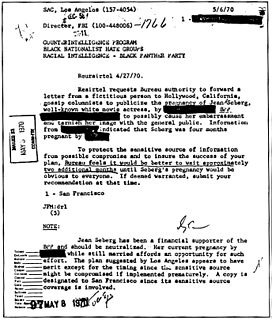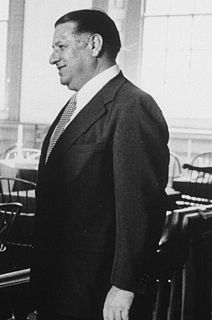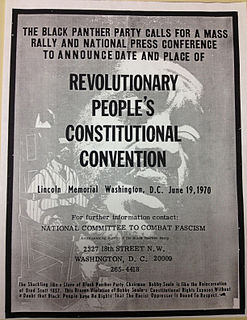
Cointelpro (1956–1971) was a series of covert and, at times, illegal projects conducted by the United States Federal Bureau of Investigation (FBI) aimed at surveilling, infiltrating, discrediting, and disrupting domestic political organizations. FBI records show that COINTELPRO resources targeted groups and individuals that the FBI deemed subversive, including feminist organizations, the Communist Party USA, anti–Vietnam War organizers, activists of the civil rights movement or Black Power movement, environmentalist and animal rights organizations, the American Indian Movement (AIM), independence movements, and a variety of organizations that were part of the broader New Left. The program also targeted the Ku Klux Klan in 1964.
Mumia Abu-Jamal is a political activist and journalist who was convicted of murder and sentenced to death in 1982 for the 1981 murder of Philadelphia police officer Daniel Faulkner. He became widely known while on death row for his writings and commentary on the criminal justice system in the United States. After numerous appeals, his death penalty sentence was overturned by a Federal court. In 2011, the prosecution agreed to a sentence of life imprisonment without parole. He entered the general prison population early the following year.

Robert George Seale is an American political activist. He and fellow activist Huey P. Newton co-founded the Black Panther Party.

Leroy Eldridge Cleaver was an American writer, and political activist who became an early leader of the Black Panther Party.

Huey Percy Newton was a revolutionary African-American political activist who, along with fellow Merritt College student Bobby Seale, co-founded the Black Panther Party in 1966. In 1967, he was involved in a shootout which led to the death of a police officer and in 1974 was accused of shooting a woman, leading to her death. During this time, he continued to pursue an academic career, eventually earning a Ph.D. in social philosophy from the University of California, Santa Cruz's History of Consciousness program in 1980. In 1989, he was murdered in Oakland, California by Tyrone Robinson, a member of the Black Guerrilla Family.

The New Black Panther Party (NBPP) is a U.S.-based black nationalist organization founded in Dallas, Texas, in 1989. Despite its name, the NBPP is not an official successor to the Black Panther Party. Members of the original Black Panther Party have insisted that the newer party is not legitimate and "there is no new Black Panther Party".

Kwame Ture was a prominent American socialist organizer in the civil rights movement in the United States and the global Pan-African movement. Born in Trinidad, he grew up in the United States from the age of 11 and became an activist while attending Howard University. He eventually developed the Black Power movement, first while leading the Student Nonviolent Coordinating Committee (SNCC), later serving as the "Honorary Prime Minister" of the Black Panther Party (BPP), and lastly as a leader of the All-African People's Revolutionary Party (A-APRP).

Fred Hampton was an American activist and revolutionary socialist. He came to prominence in Chicago as chairman of the Illinois chapter of the Black Panther Party (BPP), and deputy chairman of the national BPP. In this capacity, he founded the first multicultural political organization to be known as the "Rainbow Coalition," creating an alliance among major street gangs to end their fighting among themselves and work for social change.

Francis Lazarro Rizzo, Sr. was an American police officer and politician. He served as Philadelphia police commissioner from 1968 to 1971 and mayor of Philadelphia from 1972 to 1980.

The Black Power movement emphasized racial pride, economic empowerment, and the creation of political and cultural institutions for African-American people in the United States.

In 1970 there was a series of criminal prosecutions in New Haven, Connecticut against various members of the Black Panther Party. The charges ranged from criminal conspiracy to felony murder. All indictments stemmed from the murder of 19-year-old Alex Rackley in the early hours of May 21, 1969. The trials became a rallying-point for the American Left, and marked a decline in public support, even among the black community, for the Black Panther Party.

Kathleen Neal Cleaver is an American professor of law, known for her involvement with the Black Power movement and the Black Panther Party.

Emory Douglas worked as the Minister of Culture for the Black Panther Party from 1967 until the Party disbanded in the 1980s. His graphic art was featured in most issues of the newspaper The Black Panther. As the art director, designer, and main illustrator for The Black Panther newspaper, Douglas created images that became icons, representing black American struggles during the 1960s and 1970s.
Paul Washington was an Episcopal priest and community activist in Philadelphia, Pennsylvania.
The New Black Panther Party voter intimidation case is a political controversy in the United States concerning an incident that occurred during the 2008 election. The New Black Panther Party and two of its members, Minister King Samir Shabazz and Jerry Jackson, were charged with voter intimidation for their conduct outside a polling station in Philadelphia, Pennsylvania.

Donald Lee Cox, known as Field Marshal DC, was an early member of the leadership of the African American revolutionary leftist organization the Black Panther Party, joining the group in 1967. Cox was titled the Field Marshal of the group during the years he actively participated in its leadership, due to his familiarity with and writing about guns.

The Revolutionary People's Constitutional Convention (RPCC) was a conference organized by the Black Panther Party (BPP) that was held in Philadelphia from September 4–7, 1970. The goal of the Convention was to draft a new version of the United States Constitution and to unify factions of the radical left in the United States. The RPCC represented one of the largest gatherings of radical activists across movements and issues in the United States. The Convention was attended by a variety of organizations from the Black Power Movement, Asian American Movement, Chicano Movement, American Indian Movement, Anti-war movement, Women's Liberation, and Gay Liberation movements. Estimates of attendance range from 6,000 to 15,000. Attendees convened in workshops to draft declarations of demands related to various issues, which were ultimately intended to be incorporated into a new constitution which would function as the final vision of those movements. The RPCC also signified a shift in BPP focus from black self-defense to a broader revolutionary agenda. While conflicts did arise during the Philadelphia Convention, the conference was ultimately deemed a success by the Panthers. After the Philadelphia conference, attempts were made to reconvene to finalize and ratify the new constitution in Washington, DC a few months later but ultimately failed due to police interference and Panther disorganization.
Barbara Easley-Cox is a civil rights activist, best known for her involvement with the Black Panther Party. At the time of her first involvement, she was attending San Francisco State University. She now works in Philadelphia with a focus on literacy and education for youth.















